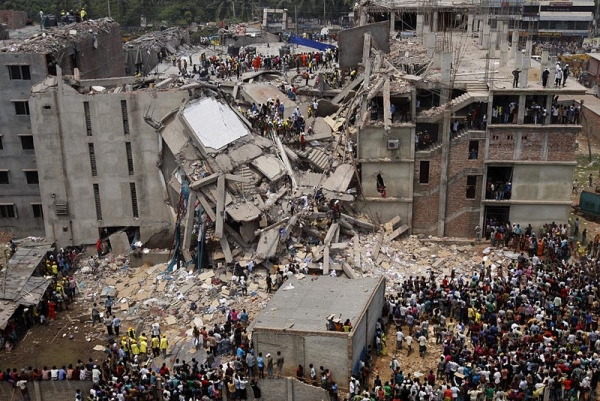Cape Town congress shows how Rana Plaza offers hope for workers’ rights

Rana Plaza was the deadliest factory disaster in history. On April 23 last year a shoddily built eight-storey building in the Bangladeshi capital, Dhaka, collapsed.
Inside at the time were some 3,500 garment workers producing top brand name goods for sale around the world. Nearly 1,000 died instantly and the final toll was 1,134 dead and more than 2,000 injured.
It was the Nigerian TB Joshua death toll magnified ten times. And although it did not receive the publicity in South Africa that it deserved, what happened at Rana Plaza should have highlighted lessons for South Africa.
However, the tragedy triggered a global response from the labour movement and human rights groups that resulted in the first ever legally binding fire and building safety accord signed with leading global clothing brand names. It also set up a compensation fund for the families of the dead and injured.
The fact that, 20 months down the line, there are still delays in paying compensation, that inadequate funding exists for building and other safety issues and that 80 000 of these potentially deadly hazards were discovered in the first-ever audit of factories is shocking. As is the fact that the 80% pay rise to many garment workers only brought their monthly pay up to about R700 and that Italian fashion house, Benetton, refuses to support the accord.
But the lessons for South Africa came to the fore when the spotlight was again cast on the Bangladeshi garment industry during a session at the UNI Global Union World Congress in Cape Town this week. In graphic and in sometimes gruesome detail, it also provided a clear answer to the continuing deregulation chorus of local free marketeers.
These are the cheer leaders of what the labour movement rightly calls the race to the bottom. They call for the scrapping of labour laws and denounce trade unions as wreckers.
Yet the anarchy they promote exists in countries such as Bangladesh where people can literally be worked to death in toxic environments. As Jyrki Raina, general secretary of the IndustriALL Global Union told the Cape Town congress, 700 workers had already died in factory fires in Bangladesh before Rana Plaza drew the world’s attention to conditions in that country.
Raina proudly announced that the T-shirt he was wearing was made in South Africa. What he did not say was that most of our ready-to-wear garments are now imported, many of them from sweatshops such as those in Dhaka.
Just check the label on your shirt, skirt or trousers and look to the footwear you buy. These may carry famous brand names, but, almost without exception, they will have been made in countries where there is little respect for worker rights and for human rights generally.
But there is the prospect of change. Because unions have followed business in “going global”. Courtesy of modern communications technology, links are being forged, even to factory level, with workers across continents.
“We cannot allow business as usual,” UNI Global’s commerce head, Alke Boessiger told the congress, a statement underlined by speakers from Argentina, Mexico, India and Brazil.
But the difficulties faced are great. And although the congress was generally upbeat about prospects, Raina admitted that the problems “are huge”.
In Bangladesh, despite the ground breaking accord, only 50,000 of an estimated 4 million garment workers are members of unions. He noted that union organisers have been kidnapped, harassed and fired. Workers were also still labouring for ten to 11 hours, six days a week.
However, the congress also heard from Colombia — “the most dangerous place to be a trade unionist” — that the battle for human and worker rights was making some progress. Change, it was stressed, is vital.
As International Trade Union Confederation general secretary Sharan Burrow warned the congress: “There are no jobs on a dead planet.”
The opinions expressed in this article are solely those of the author. No inference should be made on whether these reflect the editorial position of GroundUp.
Next: Minimum wage debate: the old cheap labour system will get us nowhere
Previous: Oliver Mtukudzi

This article is licensed under a Creative Commons Attribution-NoDerivatives 4.0 International License.


